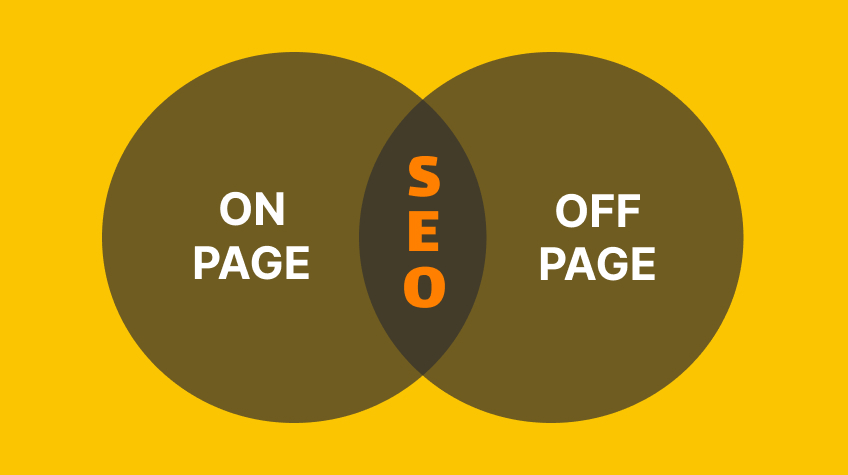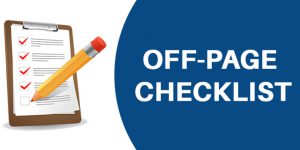
In the dynamic realm of online marketing, SEO is a crucial cornerstone, dictating a website’s visibility and success. By aligning a site’s content with search engine algorithms, SEO empowers businesses to reach their target audiences effectively. This intricate strategy branches into two primary categories: on-page and off-page SEO. On-page SEO involves:
- Optimizing individual web pages with keywords.
- Crafting valuable content.
- Refining elements like title tags and URLs.
In contrast, off-page SEO ventures beyond the website, focusing on building authority through backlinks, social media engagement, and reputation management. Mastering this dual approach is critical to command a competitive advantage in the digital terrain. We will also go through the difference between on-page and off-page SEO
What is On Page SEO?
On-page SEO embodies optimizing individual web pages to improve their position on search engine results. It revolves around fine-tuning various aspects of the webpage itself, such as integrating strategically chosen keywords into content, meta descriptions, and headers. Crafting high-quality, engaging content that aligns with user intent is a core principle, as is ensuring an organized URL structure and seamless internal linking.
On-page SEO also entails optimizing multimedia features like pictures and videos for search engines. This holistic approach ensures that each webpage meets search engine criteria and provides users with a seamless experience, improving rankings and user engagement.
What is Off Page SEO?
Off-page SEO ventures beyond the confines of the website itself, focusing on bolstering its online authority and reputation. This multifaceted strategy involves activities conducted off the website to improve its visibility in search engine rankings. The primary focus lies in building a robust network of high-quality links from trustworthy sources. Also, doing SEO competitors’ backlink analysis can also give you ideas to improve your own SEO strategy.
Engaging with the online community through social media platforms, influencer collaborations, and guest blogging also plays a pivotal role in off-page SEO. This approach demonstrates the website’s credibility to search engines, enhancing its chances of achieving higher rankings and commanding a more substantial online presence within its industry or niche.
On Page SEO and Off Page SEO: Which is More Important?
On-Page SEO
- User Experience: On-page SEO focuses on creating a seamless, user-friendly experience on your website.
- Content Quality: It emphasizes providing your audience with helpful, informative, and relevant content.
- Keyword Optimization: On-page SEO ensures your content aligns with target keywords, improving search engine visibility.
- Technical Optimization: This includes optimizing technological factors like page speed, mobile-friendliness, and structured data.
- Control: You have direct control over on-page factors, allowing quick adjustments to improve SEO.
Off-Page SEO
- Authority Building: Off-page SEO helps establish your website’s authority through backlinks and online reputation.
- Backlinks: Quality backlinks from reputable sources signal to search engines that your content is reliable.
- Brand Exposure: It extends your brand’s reach through social media engagement, influencer collaborations, and mentions.
- Community Engagement: Off-page activities involve interacting with communities and industry peers.
- Trust Signals: Off-page efforts contribute to your website’s credibility and trustworthiness.
Importance Comparison
- Synergy: Both on-page and off-page SEO are crucial. They complement each other for a comprehensive strategy.
- Start Point: On-page SEO is often the starting point, ensuring your website is optimized for users and search engines.
- Long-Term Growth: Off-page SEO’s impact can lead to long-term growth as your website’s authority increases.
- Search Engine Trust: A strong off-page presence can enhance search engines’ trust in your site’s credibility.
- Balance: Striking between both is vital for sustained and impactful SEO results.
Essentially, both On-Page and Off-Page SEO are integral to a successful SEO strategy. On-page sets the foundation, while off-page builds authority and reputation, working together to boost your website’s search engine visibility and user engagement. We have covered the crucial points regarding on-page SEO and off-page SEO differences.
On-Page SEO Factors
- Keyword Research: Identifying appropriate and traffic-generating keywords.
- Content Quality: Creating helpful, instructive, and exciting content.
- Keyword Optimization: Integrating target keywords naturally into titles, headings, and content.
- Title Tags: Crafting descriptive and keyword-rich title tags for each page.
- Meta Descriptions: Writing compelling meta descriptions that encourage clicks.
- URL Structure: Creating clean, descriptive, and readable URLs.
- Header Tags: Using H1, H2, and H3 tags to design content and enhance readability.
- Image Optimization: Optimizing images with explanatory alt tags and appropriate file sizes.
- Internal Linking: Links within your website to other relevant pages for navigation.
- Page Speed: Ensuring fast loading times for a better user experience.
- Mobile Responsiveness: Designing pages to be accessible and user-friendly on mobile devices.
- Schema Markup: Executing structured data to improve search result listings.
Remember, each factor contributes to a well-optimized on-page SEO strategy that helps improve your website’s visibility in search engine results.
Off-Page SEO factors
- Backlinks: Acquiring high-quality, authoritative, and relevant backlinks from other websites.
- Social Media Engagement: Enthusiastic participation and promotion on social media platforms.
- Online Reputation Management: Monitoring and handling online reviews and feedback.
- Influencer Collaborations: Partnering with industry influencers for brand exposure.
- Guest Blogging: Contributing valuable content to other websites for backlinks and authority.
- Social Bookmarking: Using social bookmarking sites to share your content.
- Forum Participation: Participating in relevant online forums.
- Brand Mentions: Monitoring and building recognition of your label across the net.
- Press Releases: Distributing newsworthy content through press release distribution services.
- Video and Image Sharing: Sharing multimedia content on platforms like YouTube and Pinterest.
These on and off-page SEO factors play a crucial role in establishing your website’s credibility, authority, and reputation beyond your website’s boundaries.
How to Improve Your On-Page SEO
Keyword Research and Usage
- Perform detailed keyword research to determine appropriate and high-traffic keywords.
- Integrate keywords naturally into titles, headings, and throughout your content.
- Bypass keyword stuffing; concentrate on delivering value to users.
Content Quality and Relevance
- Create comprehensive, enlightening, and engaging content that addresses user requirements.
- Employ precise and straightforward language while keeping a conversational tone.
- Guarantee your content is well-organized with appropriate headings and subheadings.
Title Tags and Meta Descriptions
- Prepare impressive, descriptive, and practical title tags for each page.
- Write brief and enticing meta descriptions that boost clicks.
URL Optimization
- Create clean, concise, and meaningful URLs that reflect the page’s content.
- Utilize hyphens to split words in URLs for readability.
Internal Linking
- Implement internal links to improve navigation within your website.
- Use defining anchor text for your internal links.
Image and Multimedia Optimization
- Optimize images with descriptive alt text and appropriate file sizes for faster loading.
- Provide transcripts for videos and audio content to make them accessible to search engines.
Mobile-Friendly Design
- Guarantee your website is responsive and user-friendly on all devices, especially mobile.
- Use responsive design or mobile-specific versions to provide seamless experiences.
Page Loading Speed
- Optimize your website’s loading speed by minimizing image sizes, using caching, and optimizing code.
- Quicker loading times enhance user experience and search engine rankings.
Schema Markup
- Implement structured data (schema markup) to help search engines comprehend your content nicely.
- Schema can enhance your search result listings with affluent snippets and more information.
Regular Content Updates
- Maintain your content up-to-date and appropriate to hold its importance.
- Update outdated information and refresh content to reflect new trends.
Applying these strategies can significantly enhance your On-Page SEO efforts, improving search engine rankings and user experiences.
How to Improve Your Off-Page SEO
Quality Backlinks
- Focus on getting high-quality, authoritative backlinks from reputed websites.
- Build diverse and relevant backlinks that naturally fit within your content.
Guest Blogging
- Contribute valuable guest posts to traditional websites in your industry.
- Ensure the content is unique, informative, and relevant to the target audience.
Social Media Engagement
- Energetically engage on social media platforms to foster community interaction.
- Transmit your content, interact with followers, and respond to comments.
Influencer Partnerships
- Collaborate with influencers or industry experts to expand your reach.
- Influencers can amplify your content and introduce it to a broader audience.
Online Reputation Management
- Watch and manage online reviews, feedback, and comments about your brand.
- Reply to both favorable and unfavorable feedback professionally.
Social Bookmarking
- Share your content on social bookmarking websites to improve visibility.
- Focus on platforms that align with your niche and target audience.
Forum Participation
- Engage in relevant online forums and communities by furnishing useful insights.
- Have a link to your website in your forum signature, if permitted.
Brand Mentions
- Observe mentions of your brand online and engage with those mentions.
- Inspire others to mention your label in a positive context.
Press Releases
- Distribute well-crafted press releases for significant company updates or events.
- Use press releases to generate buzz and secure media coverage.
Video and Image Sharing
- Share multimedia content on platforms like YouTube, Pinterest, and Instagram.
- Optimize titles, descriptions, and tags to improve discoverability.
By implementing these strategies, you can strengthen your website’s online authority, reputation, and visibility, ultimately driving better Off-Page SEO results. On and off-page SEO are equally important.
Balancing On Page and Off Page Optimization for Success
- Content Consistency: Regularly update and refresh on-page content to maintain relevance and value.
- Semantic SEO: Use semantic keywords to demonstrate content’s depth and context to search engines.
- Natural Link Profile: While building backlinks, ensure they come from diverse sources, maintaining a natural link profile.
- Local SEO: Incorporate keywords and business information for on-page Optimization and local search visibility.
- Cohesive Branding: Ensure your off-page efforts reflect consistent branding, reinforcing your identity.
- Social Proof: Utilize on-page elements to showcase user reviews and testimonials, enhancing trust.
- Structured Data: Implement schema markup for on-page content to enhance search result appearances.
- E-A-T Principle: Apply Expertise, Authoritativeness, and Trustworthiness to both on-page and off-page efforts.
- Monitoring and Adjustments: Regularly monitor analytics to identify what’s working and make necessary adjustments.
- User-Centric Approach: Prioritize creating content that addresses user needs and solves problems.
- Long-Tail Keywords: Use long-tail keywords for on-page Optimization to capture specific search intents.
- Community Engagement: Participate in relevant online communities, contributing value and earning backlinks.
- Content Promotion: Promote on-page content through off-page channels, expanding its reach and visibility.
- Link Outreach: Proactively reach for quality backlinks by providing valuable content and resources.
- Competitor Analysis: Study competitors’ on-page and off-page strategies for insights and opportunities.
- User Feedback Integration: Incorporate user feedback from reviews and comments to enhance on-page content.
- Collaborative Efforts: Align your on-page and off-page teams to ensure a synchronized SEO strategy.
- Natural Language Search: Optimize for voice search by considering natural language in on-page content and targeting featured snippets.
- Multimedia Optimization: Optimize videos and images for both on-page and off-page engagement.
- Local Citations: Ensure consistent NAP (Name, Address, Phone) information across both on-page and off-page platforms.
By harmonizing on-page and off-page optimization, you can create a comprehensive and practical approach that maximizes your website’s search visibility and engagement.
Conclusion
The difference between On-Page and Off-Page SEO strategies illuminates their combined power in SEO. On-Page SEO meticulously crafts your website’s content and structure, fostering a user-friendly experience and aligning with search engine algorithms. Meanwhile, Off-Page SEO extends its influence beyond the site, building credibility through backlinks, social engagement, and community interactions.
Rather than competing, these strategies harmonize, as On-Page SEO provides the groundwork while Off-Page SEO amplifies your online reputation. The ultimate lesson lies in recognizing their interplay; by weaving the strengths of both, you create a comprehensive strategy that elevates your website’s visibility, authority, and impact in the digital landscape. We hope this article regarding on-page and off-page SEO is helpful to the readers.






